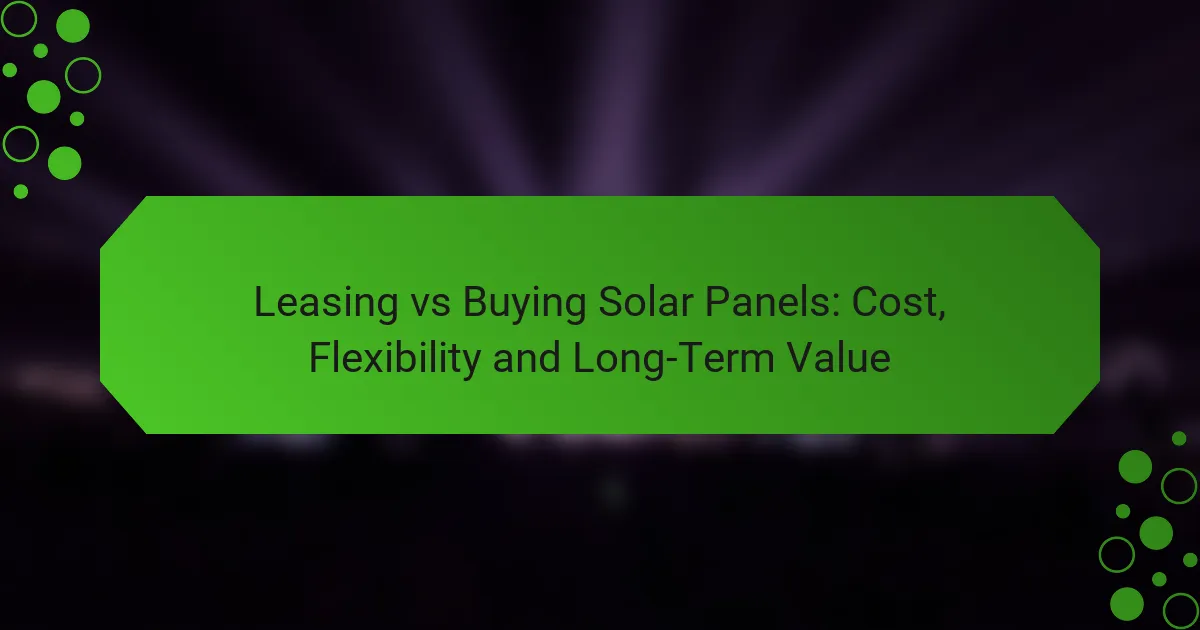When considering solar panels, the choice between leasing and buying is crucial and hinges on your financial situation and long-term objectives. Leasing often presents lower upfront costs and flexibility, while purchasing can yield greater savings and enhance your property’s value over time. Understanding these differences will help you make an informed decision that aligns with your needs.
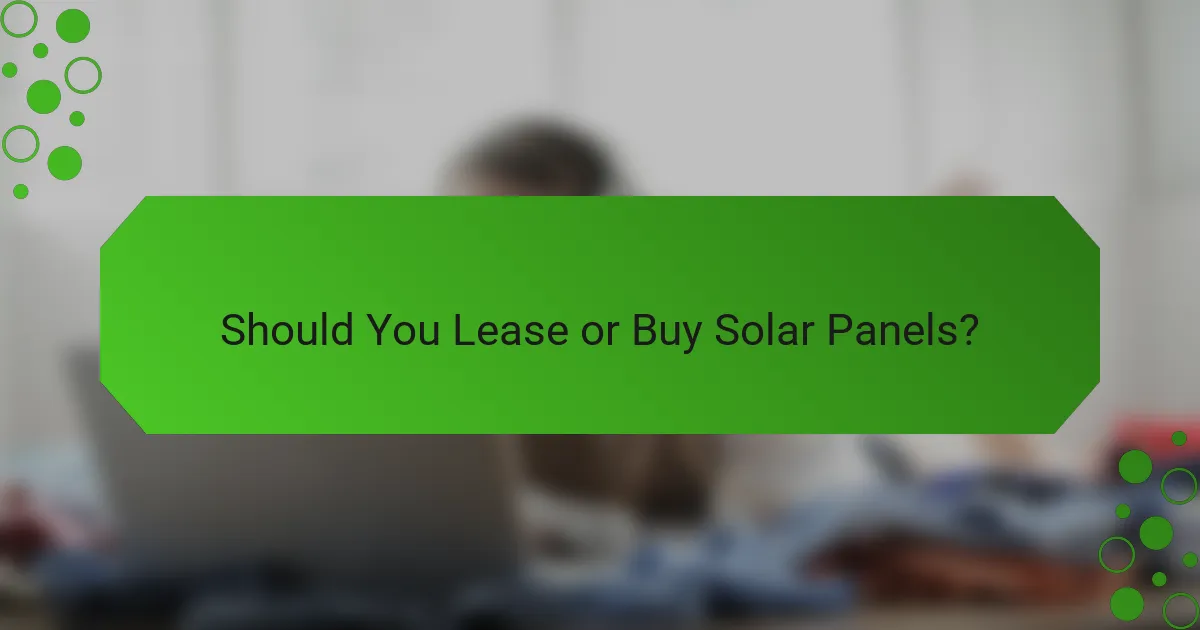
Should You Lease or Buy Solar Panels?
Deciding whether to lease or buy solar panels depends on your financial situation, long-term goals, and preferences for maintenance. Leasing typically involves lower initial costs, while buying can lead to greater savings and increased property value over time.
Leasing offers lower upfront costs
Leasing solar panels usually requires little to no down payment, making it an attractive option for those who want to avoid high initial expenses. Monthly payments are often lower than loan payments for purchasing, which can help with cash flow.
For instance, a typical lease might cost between $50 and $150 per month, depending on the system size and your location. This arrangement allows you to start using solar energy immediately without a significant financial commitment.
Buying provides long-term savings
Purchasing solar panels can lead to substantial savings over the lifespan of the system, often exceeding the total costs of leasing. Homeowners can benefit from tax credits, rebates, and net metering, which can significantly reduce overall expenses.
For example, in the U.S., the federal solar tax credit allows you to deduct a percentage of the installation cost from your federal taxes, which can amount to thousands of dollars. Over 20 to 25 years, the savings on electricity bills can make buying a more cost-effective choice.
Leasing includes maintenance services
One of the advantages of leasing solar panels is that maintenance and repairs are typically covered by the leasing company. This means you won’t have to worry about unexpected costs related to system upkeep.
Leasing agreements often include monitoring services to ensure optimal performance, which can provide peace of mind. If a problem arises, the leasing company is responsible for addressing it, allowing you to focus on enjoying the benefits of solar energy.
Buying increases property value
Owning solar panels can enhance your property’s value, making it more appealing to potential buyers. Homes with solar installations often sell at a premium, as buyers recognize the long-term savings on energy costs.
Research indicates that homes with solar panels can sell for 4% to 6% more than comparable homes without them. This increase in property value can be a significant factor for homeowners considering a long-term investment in solar energy.
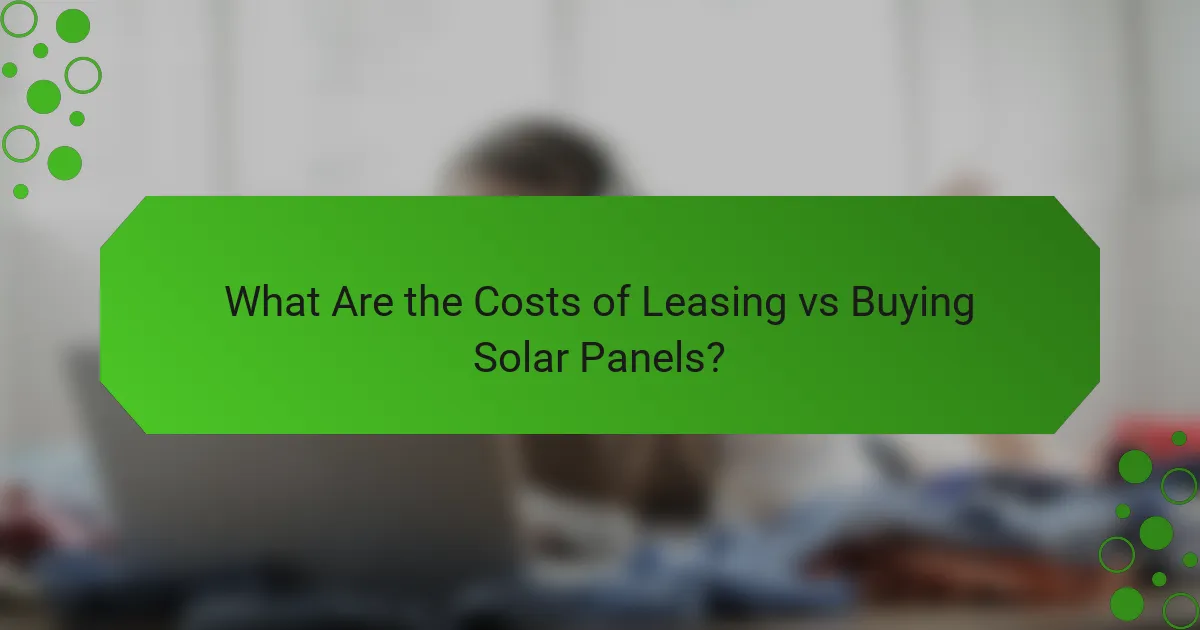
What Are the Costs of Leasing vs Buying Solar Panels?
The costs of leasing versus buying solar panels can significantly impact your financial decision. Leasing typically involves lower upfront payments, while buying requires a larger initial investment but can lead to greater long-term savings.
Leasing costs are typically lower
Leasing solar panels usually means lower initial costs, as you may only need to pay a small deposit or no upfront fees at all. Monthly lease payments can range from around $50 to $150, depending on the system size and your location.
Additionally, leasing often includes maintenance and monitoring services, which can reduce your overall expenses. This arrangement can be appealing for homeowners who want solar energy without the financial burden of a large purchase.
Buying involves higher initial investment
Purchasing solar panels outright requires a significant upfront investment, often ranging from $15,000 to $30,000 before any tax credits or incentives. This cost can vary based on system size, installation complexity, and local market conditions.
While the initial expense is higher, buying solar panels allows you to take advantage of tax credits and rebates, which can lower the effective cost. Homeowners who purchase their systems own the panels outright and can benefit from free electricity once the system is paid off.
Long-term costs favor buying
Over time, buying solar panels generally proves more cost-effective compared to leasing. After the initial investment, homeowners can enjoy decades of reduced or eliminated electricity bills, leading to substantial savings.
In contrast, leasing agreements typically last 20 to 25 years, and while they may offer short-term savings, the total cost can exceed that of purchasing in the long run. Evaluating your energy needs and financial situation is crucial to determine which option provides the best value over time.
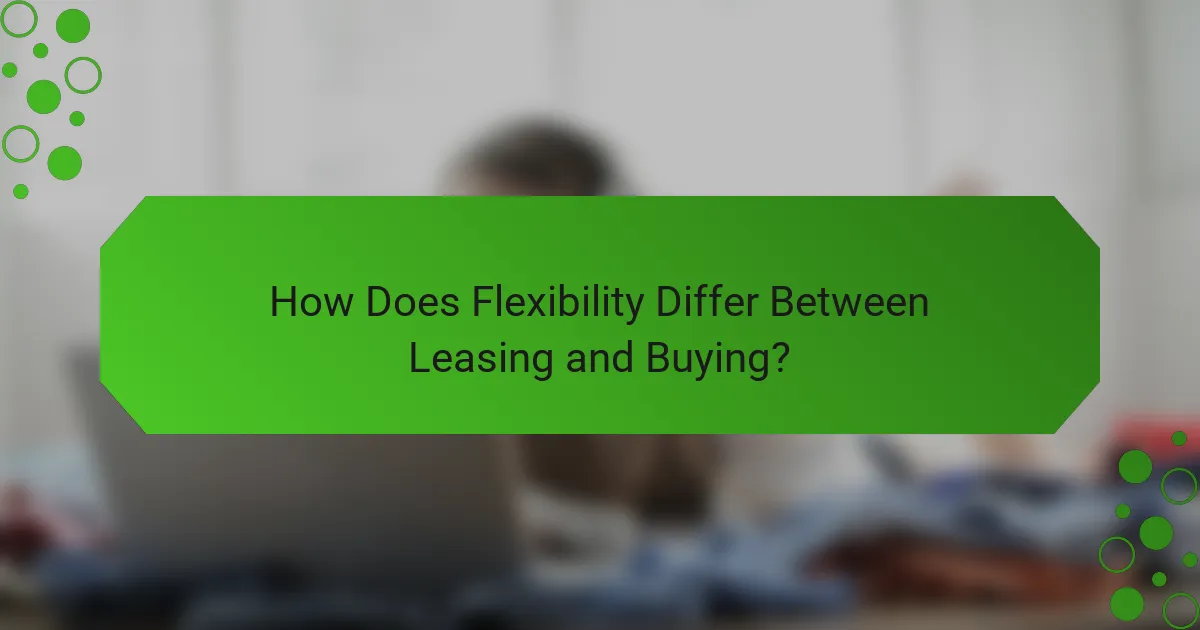
How Does Flexibility Differ Between Leasing and Buying?
Flexibility in solar panel options varies significantly between leasing and buying. Leasing typically offers easier upgrades and less commitment, while buying provides more control over the system and its modifications.
Leasing allows easier upgrades
Leasing solar panels often comes with the advantage of easier upgrades. When you lease, the provider usually handles maintenance and technology updates, allowing you to switch to newer systems without significant financial burden.
This means that if a more efficient solar technology becomes available, you can upgrade with minimal hassle, keeping your energy production optimized. Leasing contracts often include provisions for upgrades, making it a flexible choice for those who want to stay current with advancements.
Buying offers more control
When you buy solar panels, you gain complete control over your system. This ownership allows you to make decisions about maintenance, upgrades, and modifications without needing approval from a leasing company.
For homeowners who prefer to customize their solar setup or integrate additional technologies, such as battery storage, buying is often the better option. You can tailor your system to meet your specific energy needs without restrictions imposed by a lease agreement.
Leasing may limit customization
Leasing solar panels can restrict your ability to customize your system. Most leasing agreements come with predefined equipment and configurations, limiting your options for personalization.
This can be a drawback for those who want to optimize their solar setup according to specific energy goals or aesthetic preferences. If customization is a priority, consider the potential limitations of leasing before making a decision.
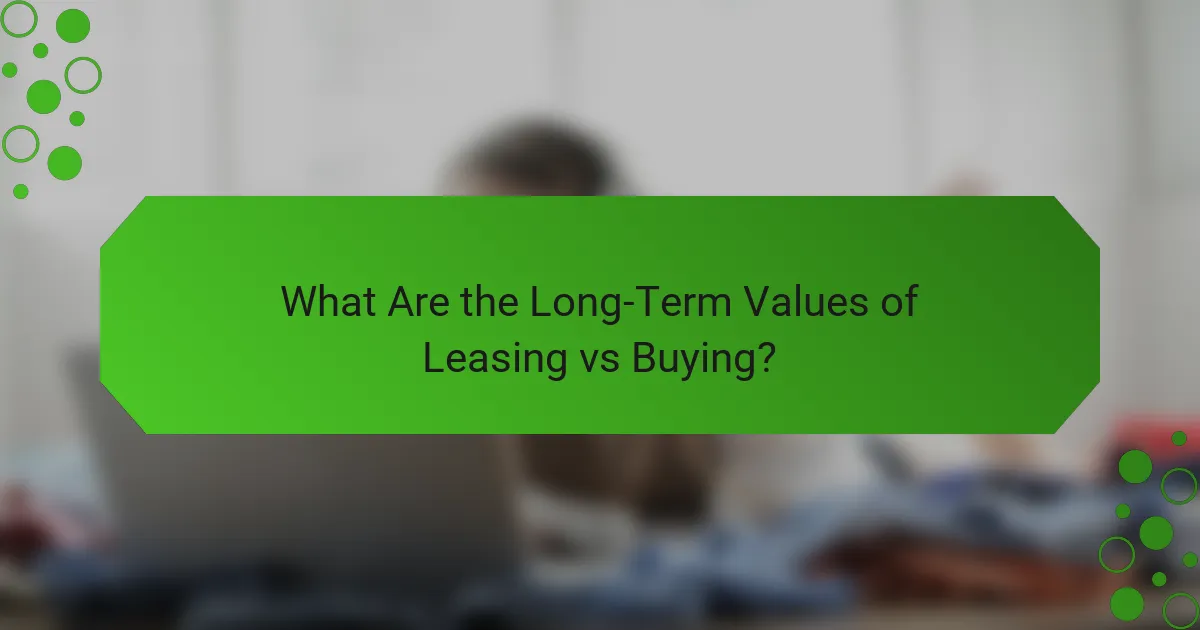
What Are the Long-Term Values of Leasing vs Buying?
The long-term values of leasing versus buying solar panels hinge on equity, total costs, and tax benefits. While buying typically builds greater equity over time, leasing may result in higher overall expenses and fewer financial advantages.
Buying yields greater equity
When you buy solar panels, you own the system outright, which means you build equity in your home. This equity can increase your property’s value, especially in markets where solar energy is in demand. Homeowners who purchase solar panels often see a return on investment that can exceed the initial costs over time.
In contrast, leasing does not contribute to home equity since the leasing company retains ownership of the panels. This means that while you may enjoy lower upfront costs, you miss out on the long-term financial benefits associated with ownership.
Leasing may lead to higher total costs
Leasing solar panels can appear more affordable initially, with little to no down payment required. However, over the lease term, which often spans 20 to 25 years, the total payments can accumulate to a significant amount, potentially exceeding the cost of purchasing the panels outright. This can be particularly true if energy prices rise, as leased systems may not provide the same savings as owned systems.
It’s essential to read the fine print of lease agreements, as they may include escalator clauses that increase monthly payments over time. Homeowners should calculate the total cost of leasing versus buying to make an informed decision.
Tax benefits favor buying
Buying solar panels often comes with substantial tax benefits, such as the federal solar investment tax credit (ITC), which allows homeowners to deduct a percentage of the installation costs from their federal taxes. This incentive can significantly reduce the upfront financial burden and improve the overall return on investment.
Leased systems typically do not qualify for these tax benefits, as the leasing company retains ownership of the panels. Homeowners should consider these tax implications when deciding between leasing and buying, as they can greatly influence long-term savings and financial outcomes.
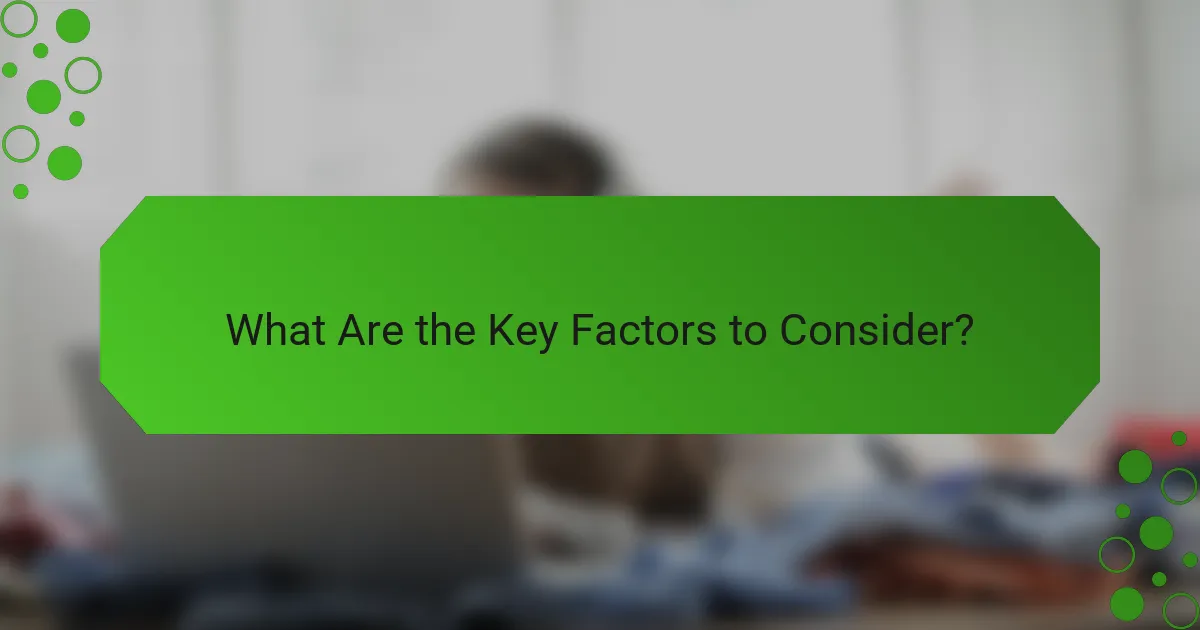
What Are the Key Factors to Consider?
When deciding between leasing and buying solar panels, several key factors come into play, including financial situation, energy goals, and local incentives. Understanding these elements can help you make an informed decision that aligns with your needs and circumstances.
Financial situation impacts decision
Your financial situation plays a crucial role in determining whether to lease or buy solar panels. If you have sufficient upfront capital, purchasing may be more cost-effective in the long run, as you can avoid ongoing lease payments and benefit from tax credits. Conversely, if cash flow is a concern, leasing can provide immediate access to solar energy with little to no initial investment.
Consider the total cost of ownership over time. Buying typically involves a higher initial cost but can lead to savings on energy bills and increased property value. Leasing, while lower in upfront costs, may result in higher overall expenses due to monthly payments and potential escalations.
Energy goals influence choice
Your energy goals significantly influence whether leasing or buying is the better option. If you aim for long-term energy independence and sustainability, purchasing solar panels may align better with your objectives. Ownership allows you to control your energy production and usage without restrictions from a leasing agreement.
On the other hand, if your primary goal is to reduce energy costs quickly without a long-term commitment, leasing might be more suitable. Leasing agreements often include maintenance and monitoring, which can simplify the solar experience for those less inclined to manage the system themselves.
Local incentives affect costs
Local incentives can greatly impact the overall costs of leasing versus buying solar panels. Many regions offer tax credits, rebates, or grants for solar installations, which can significantly reduce the purchase price. Understanding these incentives is essential for calculating the true cost of ownership.
Leasing may also come with its own set of incentives, such as reduced rates or promotional offers from solar companies. Research your local policies and programs to determine which option maximizes your savings and aligns with your financial goals. Check with local utility companies and government websites for the latest information on available incentives.
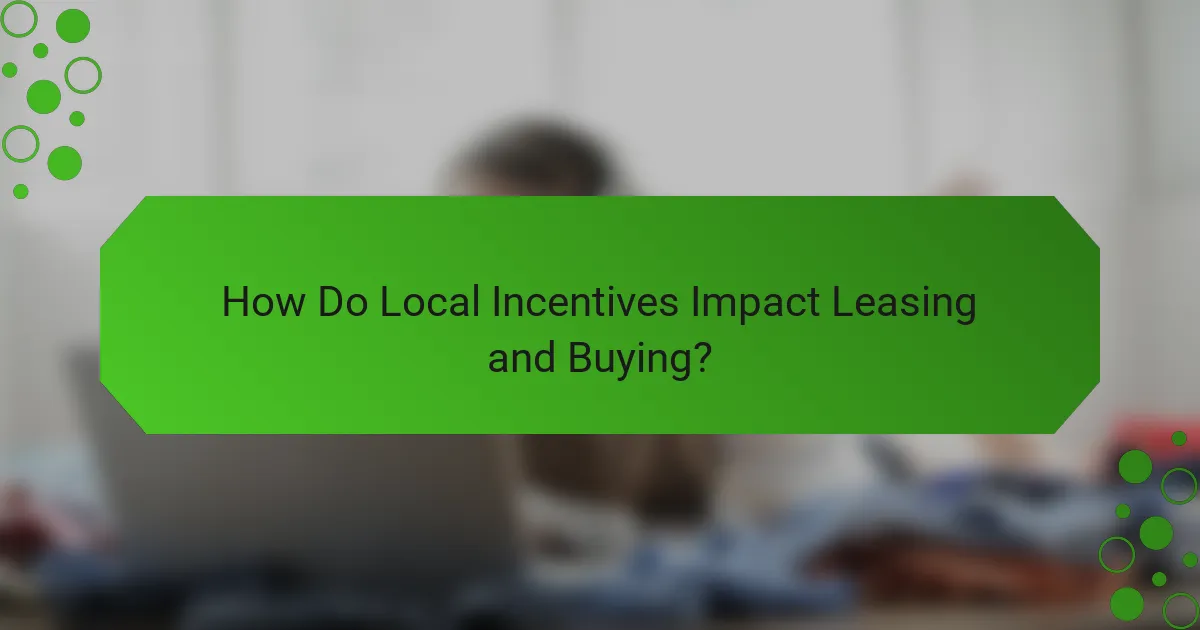
How Do Local Incentives Impact Leasing and Buying?
Local incentives can significantly affect the decision to lease or buy solar panels. These incentives may include tax credits, rebates, and grants that can lower the overall cost of solar installations, making purchasing more attractive in some regions.
Understanding Local Incentives
Local incentives vary widely by region and can include federal, state, and local programs. For example, in the United States, the federal solar tax credit allows homeowners to deduct a percentage of the installation cost from their federal taxes. Some states offer additional rebates or performance-based incentives that can further reduce costs.
When considering leasing versus buying, it’s essential to research what incentives are available in your area. These programs can influence the overall financial benefits of each option, potentially making one more favorable than the other.
Impact on Leasing Solar Panels
In regions with strong incentives, leasing can be a viable option for those who prefer not to invest a large sum upfront. Be aware that while you may benefit from lower payments, you might not reap the full financial rewards of ownership, such as tax credits.
Impact on Buying Solar Panels
Buying solar panels allows homeowners to take full advantage of local incentives, which can significantly reduce the overall cost. For instance, if a homeowner qualifies for a state rebate and the federal tax credit, the combined savings can make purchasing much more appealing financially.
Additionally, owning solar panels can increase property value and provide long-term savings on energy bills. Homeowners should calculate the total cost of ownership, including maintenance and potential increases in property taxes, to assess the true value of buying in their specific location.
